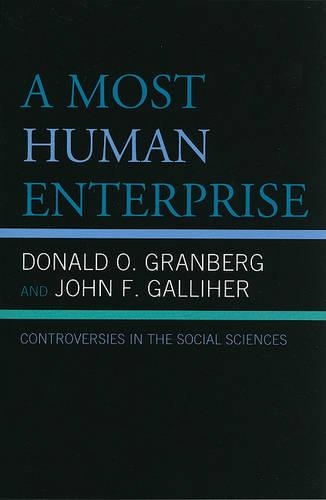
A Most Human Enterprise: Controversies in the Social Sciences
(Paperback)
Available Formats
Publishing Details
A Most Human Enterprise: Controversies in the Social Sciences
By (Author) Donald O. Granberg
By (author) John Galliher
Bloomsbury Publishing PLC
Lexington Books
18th March 2010
United States
Classifications
Tertiary Education
Non Fiction
302.072
Physical Properties
Paperback
162
Width 154mm, Height 234mm, Spine 10mm
261g
Description
A Most Human Enterprise looks at controversial social science research methods and their effects on subjects and researchers. In detailing case studies in which plagiarism was alleged, subjects were mislead or seriously abused, and research denigrated certain demographics, Donald O. Granberg and John F. Galliher demonstrate how social scientists have strayed from the ethical standards of scientific research. Case studies include the infamous Tuskegee Syphilis Study, the well-known pseudo-prison work of Philip Zimbardo, the obedience research of Stanley Milgram, and the study of sex in public places by sociologist Laud Humphreys. Many of the studies that were most damaging to human subjects were funded by government, making the current concerns of university Institutional Review Boards seem ironic. A Most Human Enterprise also investigates consequences of plagiarism in the social sciences, the role that whistle blowers can play, and the consequences of their acts. Humans are, of course, capable of lofty and amazing accomplishments. Yet they are, nevertheless, also subject to bias, prejudice, ego involvement, and poor judgment. This book demonstrates the inadequacy of Institutional Review Boards in limiting ethical lapses in the social sciences, and seeks to create a reader more sensitive to the problems and pitfalls that arise in the course of doing social research.
Reviews
A Most Human Enterprise is an exceptional academic work that combines historical data and personal narrative in creative and meaningful ways. -- Larry W. Koch, University of Michigan in Flint
Granberg & Galliher have written an ethics casebook with detail and verve. They have chosen the famous as well as the more typical examples of ethical dilemmas in the social sciences, and highlighted the critical issues. Because ethical dilemmas have no easy answers, the authors take care to report both sides of the issues. It has the most complete and fair account of the Karen Ruggiero case I have read. This book is a quick read, with compelling tales of misconduct, misadventure, and missed opportunities. It provides an ideal starting point for investigation and discussion of the conduct of research in the social sciences... -- The University of Kansas, Chris Crandall, The University of Kansas
Granberg & Galliher have written an ethics casebook with detail and verve. They have chosen the famous as well as the more typical examples of ethical dilemmas in the social sciences, and highlighted the critical issues. Because ethical dilemmas have no easy answers, the authors take care to report both sides of the issues. It has the most complete and fair account of the Karen Ruggiero case I have read. This book is a quick read, with compelling tales of misconduct, misadventure, and missed opportunities. It provides an ideal starting point for investigation and discussion of the conduct of research in the social sciences. -- The University of Kansas, Chris Crandall, The University of Kansas
Two senior academic sociologists (both, Univ. of Missouri-Columbia) review the most interesting and influential cases of professional ethical failures and controversial research practices from the 1930s to the present. The stories are fascinating and related in an easy conversational style with a wealth of background information and a minimum of interpretation. Even when writing about classic cases, such as the Tuskegee Syphilis Study or the Milgram obedience studies, the authors add contextual details that will be unfamiliar to most readers and can greatly enhance one's teaching of the subject....Summing Up: Recommended * CHOICE *
Author Bio
Donald O. Granberg is professor emeritus of sociology at University of Missouri-Columbia John F. Galliher is professor of sociology and director of peace studies at University of Missouri-Columbia.
